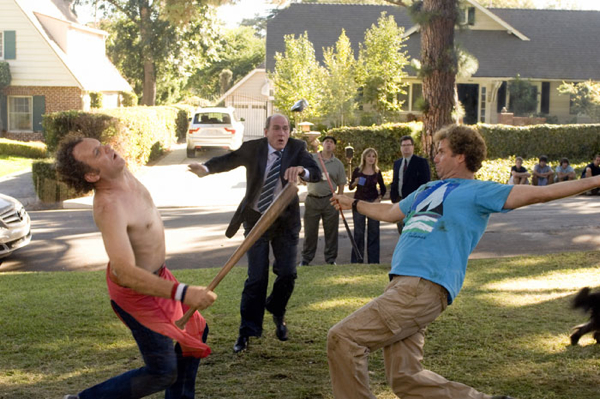Movie review by Greg Carlson
At least until “Pineapple Express” comes out in a few days, Adam McKay’s “Step Brothers” should fill a certain segment of the viewing public’s appetite for ridiculous slapstick and the kind of humor arrested in adolescence. A person’s enjoyment of the movie will depend entirely on the Will Ferrell tolerability index, which for this reviewer is generally pretty high – despite several duds on the funnyman’s resume. In “Step Brothers,” Ferrell plays a jobless slacker pushing forty who still lives with his mother.
The foolish concept – that Ferrell’s mom marries a man who happens to live with his own adult son and they all agree to share a home – demands a level of suspended disbelief upon which director McKay has staked most of his filmmaking career. Perhaps best summed up by the image of roving gangs of television newsmen engaging in a bloodthirsty melee in “Anchorman: The Legend of Ron Burgundy,” McKay’s bizarre flights of fancy arrive from left field and defy all logic and credulity. “Step Brothers,” with its misbehaving men-children building bunk beds in order to have more floor space for “activities,” follows along in that tradition.
Will Ferrell and John C. Reilly had solid chemistry in “Talladega Nights,” and they bring much of the same kind of straight-faced lunacy to their warring sibling act in “Step Brothers.” The rest of the cast is also game, and Mary Steenburgen and Richard Jenkins are in top form as the newlywed parents who hope their overgrown boys will soon leave the nest. Adam Scott, as Ferrell’s sickeningly successful brother, can play an a-hole to glorious perfection. Kathryn Hahn, as Scott’s trapped wife, also delivers a brilliant comic performance.
Like McKay and Ferrell’s previous collaborations, all manner of gag is thrown at the wall in the hope that many will stick. From Pablo Cruise t-shirts to Chewbacca masks to “Miami Vice,” pop culture references act as a kind of glue binding together the nonsensical sequences that so often result in physical violence and destructive mayhem. Despite not being blood relations, the characters played by Ferrell and Reilly discover so many mutual passions one begins to believe they might have been separated at birth. Hilariously, they both sleepwalk, and the movie does not hold anything back as the clumsy somnambulists lay waste to the family kitchen.
“Step Brothers” earns its R-rating with liberal use of profanity and the outrageous image of Ferrell applying his scrotum to Reilly’s prized drum kit. The violence is cartoonish, excessive, and often very funny (the sight of Ferrell and Reilly smacking each other with golf clubs and baseball bats has the same kind of gleeful anarchy found in the oeuvre of Larry, Moe, and Curly). In a universe where movies about men who refuse to grow up dominate the major studios’ comedy slate, some filmgoers will dismiss “Step Brothers” as another obnoxious entry in a chain that dates back at least as far as “Dumb & Dumber.” It would be pointless to convince them to attend, even if “Step Brothers” makes a few sly comments about the dependence of adult children on their parents and the ways in which families get along with measures of love and hate.
